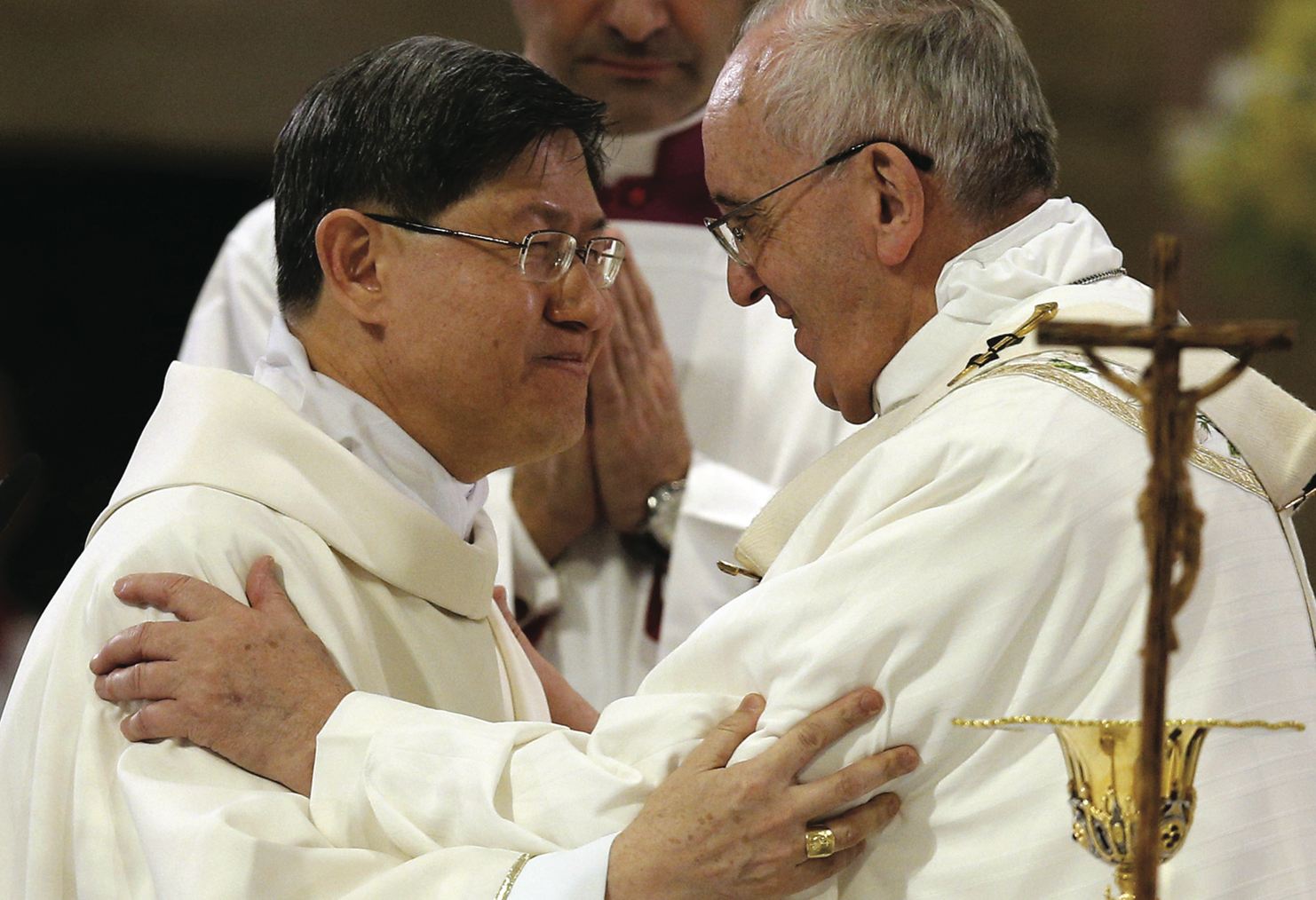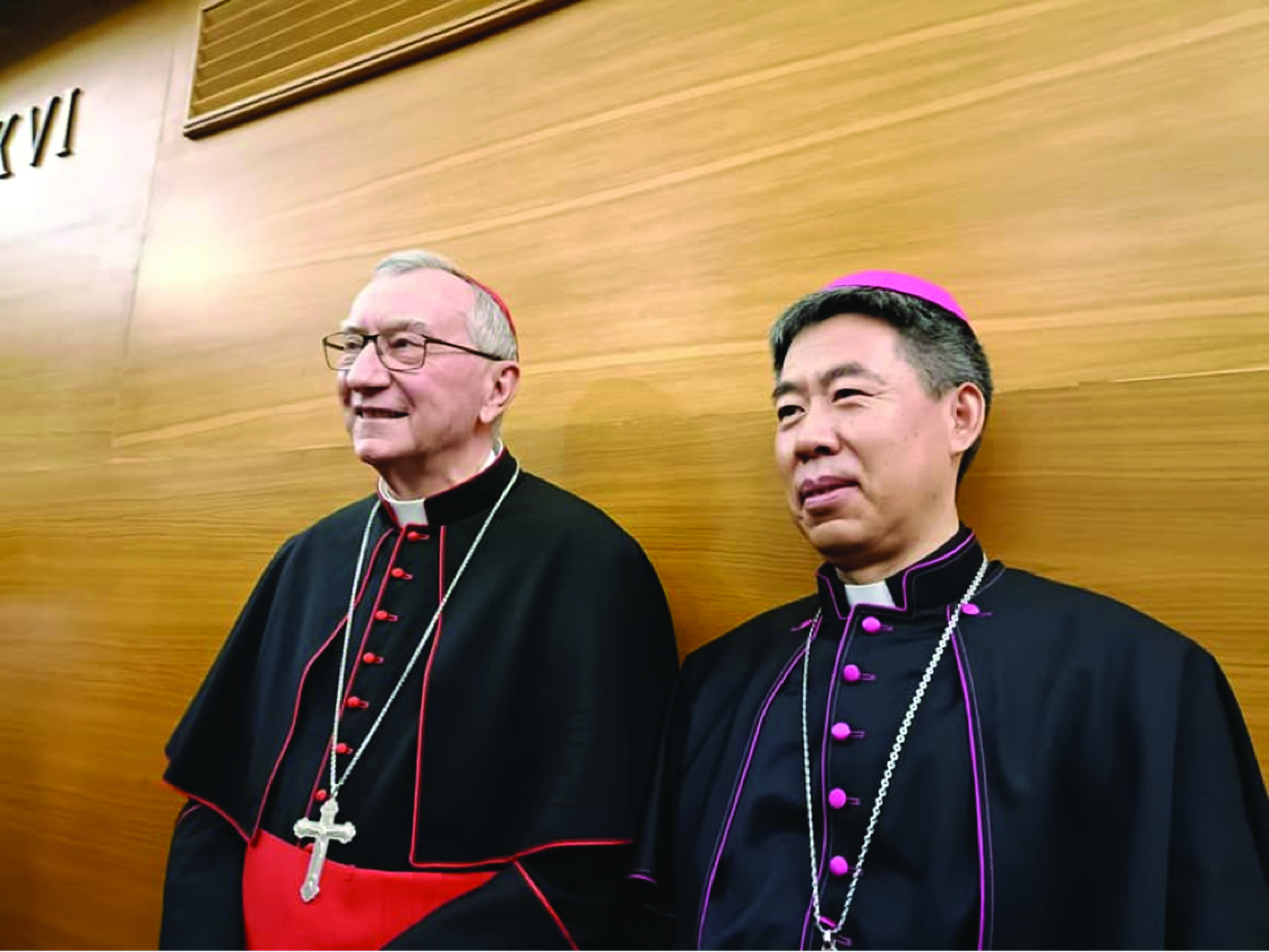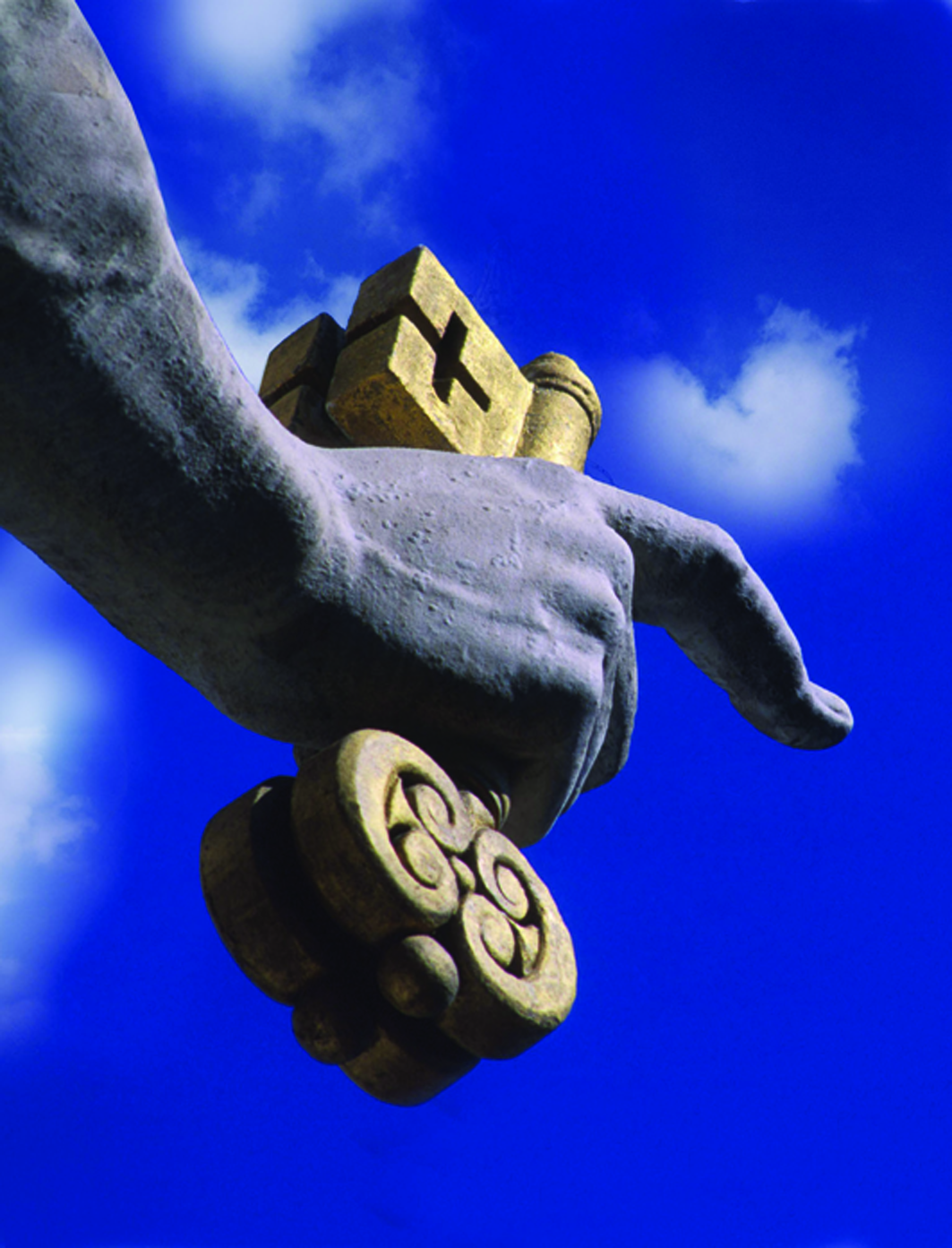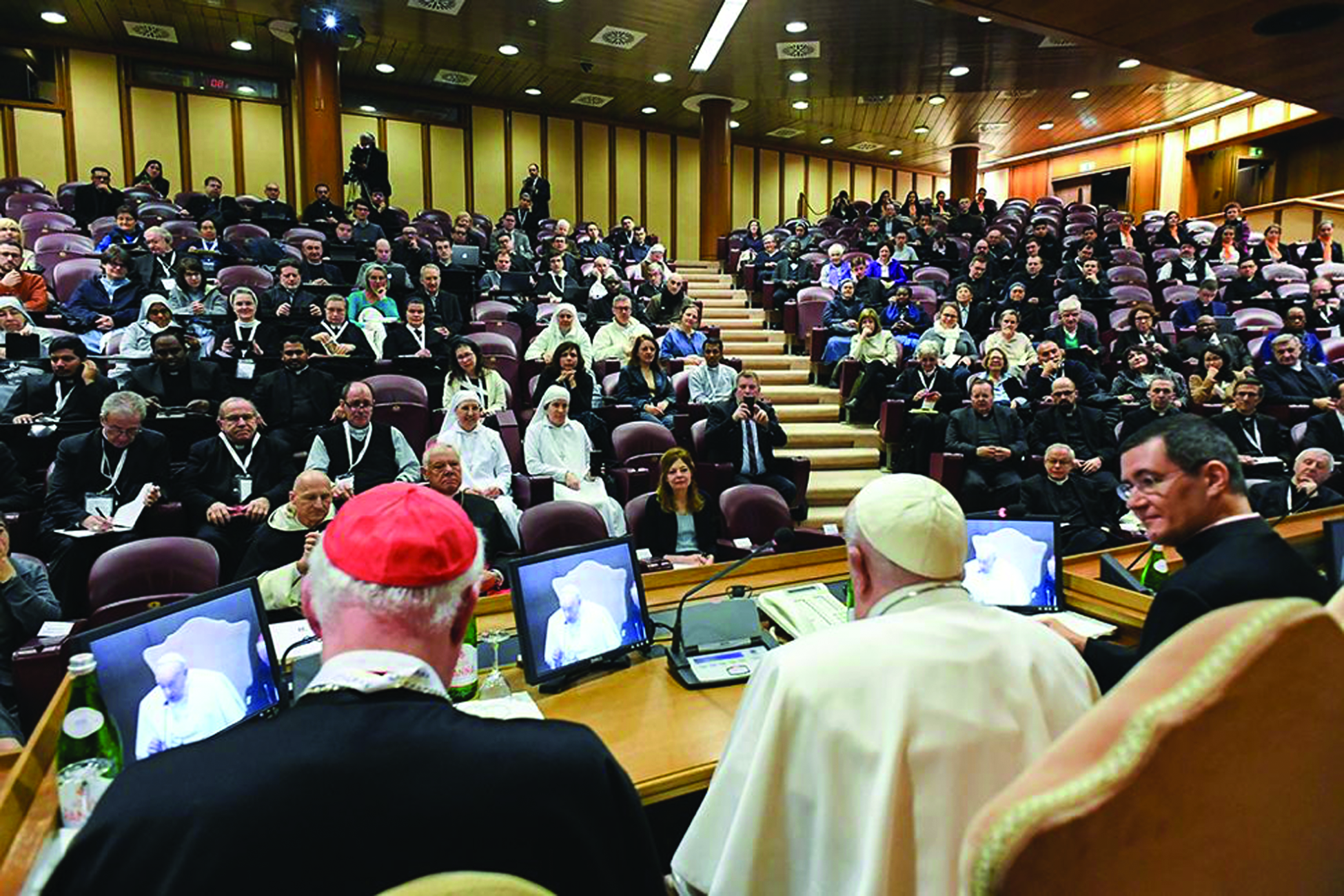The charismatic cardinal from the Philippines, who is fluent in English, has been named the new head of Caritas Internationalis. This gives him greater international stature. Some see him as a possible Pope

Pope Francis greets Cardinal Luis Antonio Tagle of Manila, Philippines, at the sign of peace while celebrating Mass at the city’s Cathedral of the Immaculate Conception on January 16 (CNS photo/Paul Haring)
“I accept this election in the name of all the poor people in the world.” With these words, the Filipino cardinal, Luis Antonio Tagle, accepted his recent election as the new president of Caritas Internationalis.
He is the first Asian to head this confederation of Catholic Church charity agencies (including Catholic Relief Services) from 165 countries and will lead the organization for the next four years. His election was widely expected.
He gained 91 out of the 133 votes cast in the ballot on Thursday afternoon, May 14, at the organization’s General Assembly in Rome. He succeeds the dynamic Cardinal Oscar Rodriguez Maradiaga of Honduras who has held this high-profile post for the past eight years.
Speaking to the 300 delegates from across the globe by phone from Chicago (where he was receiving a doctorate from Catholic Theological Union, Chicago) after his election, he thanked them for the “trust” they put in him. “I’m limited in my capacities but with all of you, with the love that Jesus has poured into our hearts and in the name of all the poor people in the world, I accept this election. Let us together strengthen the church of the poor so our witness can help build a world of understanding justice, true freedom and peace.”
His election comes at a crucially important moment in the history of the Church and of the world. It comes on the eve of Pope Francis’ much-awaited encyclical on ecology which is expected to be published in June. It also come months before two major international events that are of great importance for the future of humanity: the UN summit to agree on goals for sustainable development in the world, which will be held in New York in September, and the UN Conference on Climate Change that will be held in Paris at the end of November and early December.
A charismatic and inspiring leader, Tagle will be a powerful voice on the world stage on the issues that will be central to the encyclical and to the UN summits. He will be a forceful advocate on those issues because, coming from the Philippines, with their more than 7,000 islands, he knows well what poverty means, and the damage done by the growing gap between rich and poor and the strengths and failures of the present economic system. He is profoundly conscious of the need to help the victims of natural disasters and is convinced of the pressing need to address climate change. He is keenly aware of the problem of migration, as 11 million of his own Filipino people have had to leave their homeland to escape poverty over recent years.
The 57-year-old cardinal, who has been archbishop of Manila since October 2011, studied in the Philippines, the United States and Italy. He is a humble, deeply spiritual and friendly man who resembles Pope Francis in many ways. He lives a simple life, uses public transport and is close to the poor. He fully shares the approach and vision of the first Pope from the southern hemisphere and is very close him, as was plain for all to see when Francis visited the Philippines in January.
He seems a good choice to lead Caritas Internationalis, whose mission is to express the love and charity of Christ to the peoples of the world, and especially the poor, by helping the Catholic Church be a Church for the poor, respond to major emergencies, promote sustainable development and thereby eliminate hunger and poverty, promote care for creation, and build “global solidarity.”
A gifted communicator, Tagle will certainly inspire Caritas’ more than 2 million volunteers who work in 200 countries, and he will challenge and encourage world leaders about the need to address the great problems of humanity.
Already seen as the most inspiring Church leader in Asia and considered a “long-shot” candidate to be Pope at the 2013 conclave, this new position casts him still more into the international spotlight and gives more openings for his talents. He will be an asset to Caritas Internationalis in its global mission.
Right now, notes American journalist John Allen, Jr., the Irish betting firm Paddy Power has Cardinal Tagle as the favorite to be the next Pope, giving him 11/2 odds.
(For the record, Paddy Power has Cardinal Sean O’Malley of Boston as the American with the best odds, at 10-1.)
“Granted, such forecasts don’t have a particularly good track record,” Allen notes. “Papal elections occur only when the incumbent either dies or resigns, and at the moment Francis seems perfectly healthy with no sign of slowing down. Between today and whenever a conclave might occur, any number of things can happen to change the landscape.
“That dose of caution, however, rarely stops ‘next Pope’ rumors from being the Church’s favorite parlor game,” he continues. “So if we’re going to go down that route, there’s a great deal to be said for Tagle, who would make a strong runner if the key issue next time is continuity with Francis.”
Tagle, he says, is “seen as the Catholic rock star of Asia because of his high media profile and wildly successful TV and internet broadcasts.”
So, since “building a ‘poor Church for the poor’ is the motto of the Francis era, and from his perch at Caritas, Tagle,” he concludes, “is now poised to become one of the most influential architects of that push after the pontiff himself.”
“He Has Anointed Me to Bring Good News to the Poor”
New president of Caritas Africa shares vision for the poor

Ghana’s Archbishop of Kumasi, Gabriel Justice Yaw Anokye, seen here during a priestly ordination, was elected President of Caritas Africa at a May meeting of Caritas Africa held in Rome
Archbishop Gabriel Justice Yaw Anokye of Kumasi, Ghana, is the newly-elected president of Caritas Africa. In this interview, he shares his vision of a Church for the poor in Africa with Communications Specialist and Business Development Associate for the Catholic Caritas Foundation of Nigeria, Cecilia Agrinya. The Caritas International General Assembly took place May 12-17 in Rome.
What does the General Assembly mean for delegates from Africa?
Archbishop Gabriel Justic Yaw Anokye: Caritas Africa attends this 20th General Assembly in fidelity and in brotherliness as one family. This year, as the theme tells us, we all want to care for creation, we are one human family, one creation and every part of this family must come together to think of the whole.
We have also come to join our brothers and sisters from other Caritas member countries to form one big family, share success stories and challenges while learning from each other how to chart the way forward to achieve our mission and vision of serving the poor and caring for creation as Caritas.
Looking at what Pope Francis says about a “Church for the poor,” what does this mean in Africa?
Anokye: The mission of Christ as announced by Himself in Isaiah, Chapter 51: “The Spirit of the Lord is upon me, He has anointed me to bring the good news to the poor…” Similarly, in Christ’s Sermon on the Mount; the first Beatitude says “Blessed are the poor in spirit.”
So you can see that He, though rich in His divinity, became poor (Philippians 2:6), in order to make us wealthy, divinized to share in His riches; this is the philosophy, theology, vision and indeed the mission of Christ; to raise the poor, to bring the lowly to a higher level. He did not come to save angels or raise again those who are already high up but to raise the poor, lowly, widows, orphans and strangers. These categories of people we call the poor are treated as the apples of His eyes and are kept very well by God Himself who hears the cry of the poor.
Therefore, Caritas, which has issued from the heart of the Church’s missionary and charitable activities, must also care for the poor. We do support the Pope as he reminds us of our duty to care for the poor. So, for the Church to be able to serve the poor, it must be poor — “a Poor Church” — to be able to enter the ghettos, the sowetos, the zongos of our villages and hard-to-reach communities, and support the poor where they are as Caritas (Church).
Going forward, looking at your role of being in charge of the Justice and Peace Commission, how do you see Caritas and Justice and Peace working together in member countries of the African region, especially where they exist in parallel?
Anokye: Before my election as president of Caritas Africa, I was and I still am the second vice president of the Symposium of Episcopal Conferences of Africa and Madagascar (SECAM). As the second vice president, I am in charge of the Justice and Peace Commission, good governance, advocacy and lobbying (speaking for and against). I’m also in charge of development, migration and health. All these areas concern the human being as the focus of our activities. As we speak for justice and advocate for human rights, we are doing the work of Caritas, the work of love.
Because if I look for justice for others, advocate for peace, good governance, transparency and accountability from African leaders to ensure growth and development for the common man, I’m showing love, which means Caritas. Bringing food to the suffering, visiting those who are sick or in prison, being in solidarity with those affected by earthquakes and other natural and man-made disasters, is the visible part of justice, peace and reconciliation.
Justice, peace, development and reconciliation are integrated into the work of Caritas. One is more visible and the other structural, but the two go together.
As the new president, what is your vision of Caritas Africa?
Anokye: Let me start by referring you to what Jesus himself said in Matthew 7:15, “I came to fulfill, not to abolish.”
In line with this, whatever vision there is already for Caritas Africa is what I am going to fulfill and our vision is to “give life in abundance” (John 10:10).
I am not going to change that vision, but to fulfill it by making sure it is owned by everybody, loved, cherished and implemented. I am going to talk about it, remind members of the African region.
The mission of achieving this is surely to bring people to know it, talk about it more, form people and also commission people to do precisely that. So I am going to align with the old vision of Caritas Africa and ensure that we achieve our mission of reaching out in love to our brothers and sisters who are in need.
Cardinal Parolin Exhorts Caritas Members to “See With The Eyes of Christ”
“Shaking someone’s hand, looking into their eyes, offering a friendly presence, saving a person from loneliness—these should be the concern of Caritas,” said Cardinal Pietro Parolin during a homily at a May 16 Mass for Caritas clergy and staff. The cardinal, who is Secretary of State for the Holy See, urged Caritas workers to remember that their “personal attitude” and “personal encounter with the person who is suffering” are crucial parts of carrying out the Caritas mission.
“Behind every social phenomenon there are people,” he said during the Mass, which was celebrated as part of the Caritas Internationalis General Assembly in Rome. He encouraged the Caritas family to be aware of the “personal dimension of misery” and “see with the eyes of Christ.”
“Caritas does not exist without a vital relationship with the Church,” Parolin went on, noting that no connections with “international sponsors can make us deviate from this profound communion… It is our identity.”
Speaking of Caritas’ emergency response work, the cardinal remembered the earthquake in Nepal and the crises in Syria and Iraq, to which “the international community has not been able to find a path” to a peaceful solution. During the prayers of the faithful, the congregation remembered victims of emergencies such as the current conflict in Ukraine. Later in the Mass, Parolin thanked Cardinal Oscar Rodriguez Maradiaga, former president of Caritas Internationalis, for his years of service. In his homily, he also thanked all Caritas workers worldwide. A personal attitude of love “gives sense to our presence in the world as a continuation of the Lord’s presence,” Parolin said. “Thank you for being the direct witness of God’s love for humanity.”
—Caritas Internationalis







Facebook Comments